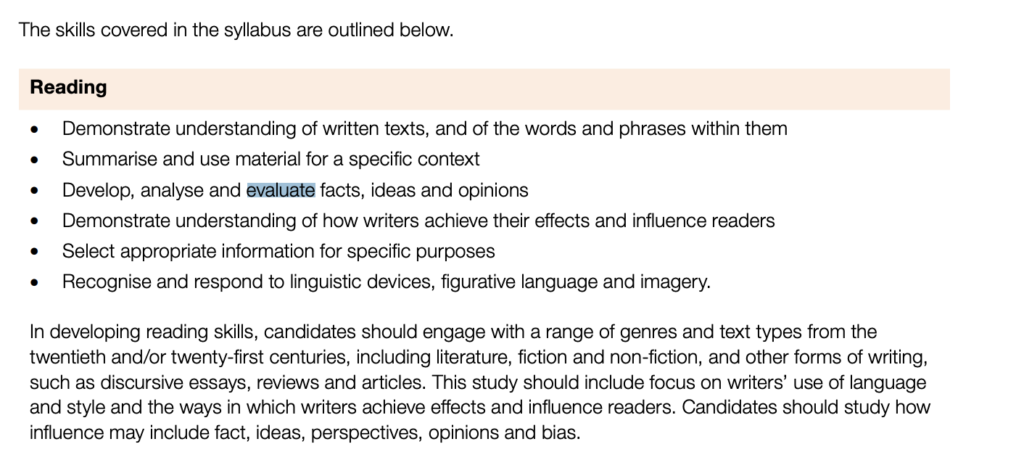How to “Evaluate” in IGCSE First Language English.

Evaluate.

It’s such an apparently simple word and appears in so many different places, yet it’s one that so many of my students have trouble with.
When they see it, they cringe – many of them don’t know what to do; rather than evaluate, they summarize.
But what does it actually mean to evaluate something?
To evaluate something means to assess it, to justify why you believe it is true.
In the context of the English language, evaluation means looking at statements, thinking about the ways in which they are justified, and to either accept the statement or reject it based on the evidence and a sound reasoning process, before you write out your thoughts on paper.
For many students, however, this is both vague and foreign, because evaluate requires something more than just the ability to read content – it requires the ability to understand ideas, to synthesize them, and to logically reason with them.
If any of these steps is affected, a good evaluation cannot be produced.
Many students (and perhaps yourself) struggle with producing the kinds of evaluations that are necessary for the highest possible marks, partly because they lack experience in performing evaluations and partly because they don’t understand what to look for.
Sometimes, it is hard to fault them for this – after all, evaluation requires you to demonstrate something that’s not inside the text and to actually think about what it means – and how can you do this, if you’ve never spent any time in your life questioning the meaning of words or how to use them effectively?
This may sound vague for you, and it probably is…
But allow me to clarify.
Let me show you what an evaluation is not.
To do so, I’ll show you an example that one of my students recently wrote in response to Question 1 of Summer 2021, Variant 2.
Here is the insert:
Here’s the question text:
Question 1
Write a magazine article for young people about modern friendship.
In your article you should:• evaluate the ideas about friendship given in both texts
• explain, based on what you read, to what extent you think social media affects friendship.
Base your article on what you have read in both texts, but be careful to use your own words.
Address both of the bullet points.
Write about 250 to 350 words.
…And lastly, here’s a paragraph written by one of my students below in response to the insert, and to the bullet point “evaluate the ideas about friendship given in both texts”:
The first article I read, “My best friendships happen online but that doesn’t make them any less valid”, discusses the topic of online friendships. In the article, the writer defends the idea of forming friendships on social media. The writer argues that social media allows one to connect, strengthen bonds with others and make new friends, allowing them to help fight the loneliness they feel. Furthermore, social media provides a place where anyone can freely express themselves, just like they would in real life. Additionally, social media is now an important tool for people who find social interaction challenging in real life.
On the other hand, the second article I read was “The limits of friendship”. In the article, research done by Robin Dunbar, an anthropologist, presented the importance of genuine friendship and that people who have a small social circle are more capable of maintaining a closer relationship with one another. Additionally, the article discusses the impact of social media on human interactions. It said that the interactions people receive on social media are not as meaningful as face-to-face interactions, because when individuals share an experience together, they can bond better in ways that social media does not allow.
So, dear reader, what do you think the problem is here?
The student’s response provides a summary of the main ideas from both texts, but it does not fully evaluate the ideas about friendship presented in each text.
The response outlines the points made in the articles but does not go further to assess the strengths and weaknesses of each argument, consider alternative viewpoints, or discuss the implications of these ideas on modern friendship.
In other words, the student has missed the point of what was asked of them altogether and would not earn marks for this evaluation, because…
An evaluation is not a summary.
When you are asked to evaluate, you are not being asked to summarize. These are two completely different tasks.
Summarizing involves taking ideas directly from a text and then repeating them, perhaps in condensed form.
Evaluation entails making judgments – that you not only take in the words that you see in the text, but also contextualize them to your own situation and your own understanding; it entails that you process what is going on and reference it to your own understanding of things.
If you don’t do that… I’m sorry, you don’t have a choice. Either you do that, or you cannot do well.
Does it seem harsh?
I’m sure it does.
I’m sorry, but I don’t have a choice but to tell it to you as it is.
We’re not here to comfort you, to tell you that it’s okay when it’s not – that would be a disservice to you of the highest order, because no matter what, you need to improve.
So that said… Let’s evaluate the texts’ ideas about friendship together!
Let me first highlight the key points of what we are going to do in this next section, which will teach you how to evaluate.
How to Evaluate.
- Understand the text.
You need to understand what is going on inside the text. If you don’t understand what’s going on, then you will have no recourse but to read it again and try to understand it.
Read it and re-read it. Challenge your mind and your understanding of what’s going on – ask yourself questions about what you see, as you think about what is going on.
For example, you can ask yourself – how are certain things in one part of the passage related to the rest? What do the pronouns refer to? Always reason, clarify, and verify that what you understand accords with what is going on inside the text by cross-checking.
- Logically reason with the content of the text.
Once you have developed a good understanding of the content of a text, ask yourself how the different parts of the text fit together. Think for a moment – do you agree with the argument overall? Don’t decide yet, though – simply ask yourself the question in advance. Moving forward from there, you can proceed. Are there certain assumptions being made in the argument? Does the applicability of this argument only suit a limited context?
These are all important questions that you will need to clarify. - Synthesize the text in relation to what you are being asked to do.
Each of the evaluations that you are going to do will be done in relation to a specific context – it won’t just occur in an isolated situation, but rather will be directly connected to specific questions that it’s going to be your duty to deal with.
Are you supposed to give a speech or write an article, for example? If you are, then ask yourself: Who is your audience, what register would be suitable to them, and what would be valuable for your audience to hear?
Firstly, we must understand the text.
This means that you should read and re-read the text.
Ask yourself: What are they about?
Here’s a summary for those of you who have been following this.
Text A discusses the positive aspects of online friendships and argues that they are just as valid as face-to-face friendships. The author notes that the internet is often blamed for causing loneliness, low self-esteem, and social isolation, but also highlights how it has enabled many people to form meaningful relationships. The author shares personal experiences of their online friendships, stating that they can be authentic and substantial despite the lack of physical proximity. The text also acknowledges the role of technology and social media in connecting people who might otherwise struggle with in-person social interactions, such as introverts or people with disabilities.
Text B, on the other hand, focuses on the limits of friendship and how social media is changing the nature of human interaction. The text references anthropologist Robin Dunbar’s research, which suggests that humans can maintain a maximum of 150 social connections and that only five of these connections will be closest to us. Despite the increasing use of social media, Dunbar’s number of 150 has remained constant. The author argues that while social media allows us to keep track of more people, it lacks the shared experiences that strengthen face-to-face friendships. Additionally, the time spent on superficial online relationships may come at the expense of deeper, more meaningful connections.
Okay, now let’s respond to the question.
Question 1
Write a magazine article for young people about modern friendship.
In your article you should:
• evaluate the ideas about friendship given in both texts
• explain, based on what you read, to what extent you think social media affects friendship.
Base your article on what you have read in both texts, but be careful to use your own words.
Address both of the bullet points.
Write about 250 to 350 words.
Please Log In to your members’ account to access this resource. If you haven’t signed up yet, make sure to Join Now!
So, that’s my attempt – I don’t claim that it’s perfect, but I hope that it will give you a good start to things!
Let’s analyze what was done here. Throughout the writing process, I tried to…
- Compare and contrast the ideas presented in both texts: Instead of simply summarizing each article, I analyzed how the ideas about online friendships in Text A relate to the ideas about the limits of friendship in Text B, which helped the reader to recognize the complexities of modern friendships.
- Evaluate the strengths and weaknesses of each argument: I assessed the validity and relevance of the points made in each text, considering the evidence presented and any potential biases or limitations in the arguments. This is crucial for a good evaluation, because it involves reasoning through each argument and analyzing where the arguments make sense and do not, subjecting the arguments to one’s own experiences and thoughts.
- Consider alternative viewpoints: I tried to explore other perspectives on modern friendship that might not be covered in the texts. This could include discussing the role of technology in facilitating long-distance friendships, the impact of social media on mental health, and the potential for online friendships to transition into face-to-face relationships.
- Discuss the implications of the ideas presented: I tried to consider how the ideas about friendship in the texts might impact young people’s experiences and expectations of modern friendships and also discuss strategies for maintaining a healthy balance between online and offline relationships.
Once again, I won’t say that that’s perfect by any means, but as a teacher, express the hope that reading this and implementing the suggestions included managed to assist you in some way, shape, or form to achieve your goals.
There are many ways in which you can grow as a writer and as a thinker, and learning how to develop this skill is definitely one of those things 🙂
Good luck in your evaluation journey, and I will see you in the next post!
victortanws
6 thoughts on “How to “Evaluate” in IGCSE First Language English.”
Leave A Comment Cancel reply
You must be logged in to post a comment.
Recommended Posts
Welcome to the ultimate guide to conquering the 0500 First Language English exam! Whether you’re a student or a teacher, we are confident that you’ll find some value here. The materials on this site will break down the IGCSE First Language English curriculum for you, offer you some helpful tips, […]
As students, you may know, writing isn’t always easy. Beyond the idea of getting inspiration and just knowing what to talk about even as you write, it’s often not easy to know exactly what you’re going to say along the way. Often you may know certain rules of grammar or […]
You wake up in the morning and you realize that it’s a new day. Oh my god, do I really have to do this again? That’s probably the first thought that comes to your mind. You already did this yesterday. But now everything’s starting again. That whole cycle of going […]
Good luck to all of you out there who are taking your 0500 paper 1 tomorrow! I trust it’s going to be an interesting experience, and as you go into the exam, go in the knowledge that you have already prepared your very best, but do remember some of the […]
Dear all, The Descriptive essay compilation has been updated! Want to gain the exact examples you need for that A*? Sign up for a Premium membership so that you don’t miss out, today! V. We hope you enjoyed these essays! If you want to join our IGCSE First Language English […]
Dear all, Wow! The IGCSE is coming up quick! With that in mind… The Descriptive essay compilation has been updated! Want to gain the exact examples you need for that A*? Sign up for a Premium membership so that you don’t miss out, today! V. You’ll find the new essays […]
Learning English is often thought of as something daunting, a chore, an annoyance maybe, especially if you’ve come from a background where your first language isn’t English, but you’ve been forced to take this accursed paper because you need it for a scholarship, a university replacement, or just because your […]





YEOH IRENE
Well done for your ENGLISH paper sharing!
A little request from me: can u share the IGCSE Malay papers 1 & 2 with answers? Thanx
Shem
Great job.
Chris
You said:
“Write about 250 to 350 words.
So, that’s my attempt – I don’t claim that it’s perfect, but I hope that it will give you a good start to things!”
Did you forget to include your evaluation? I was confused because I expected to see your answer there.
victortanws
Oh yup! It’s there, but I just didn’t place the “No access” message there for people who don’t have a membership – thank you for highlighting this!
helo
Hi
I cannot see the correct sample evaluation. Kindly share as it would be very helpful
victortanws
You can gain access if you sign up for a membership! It is free 🙂 Thank you for reading and for dropping by!